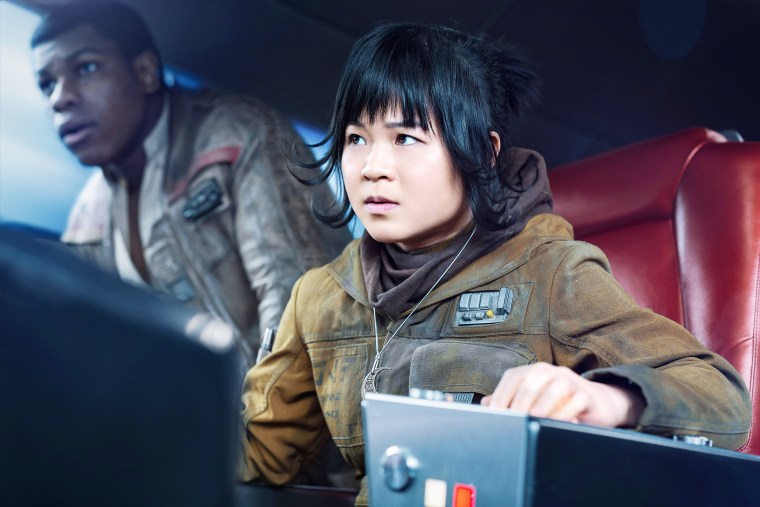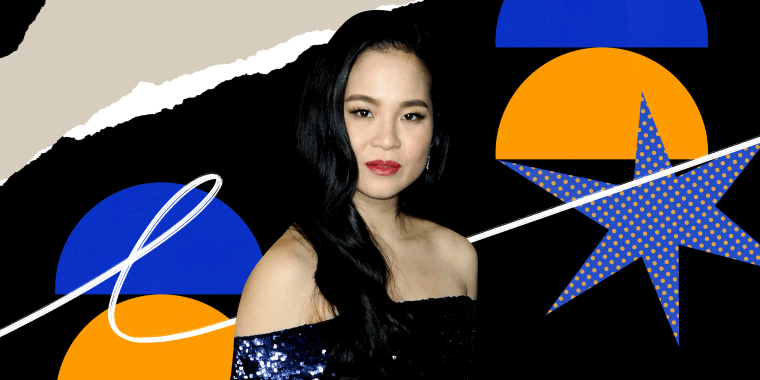Actor Kelly Marie Tran has a long list of Hollywood credits to her name. But in just about every interview, including a recent one-on-one with TODAY, she's asked about the importance of diversity in media.
It's something she "absolutely" gets tired of talking about, she laughed, but also something she plans to keep talking about until "we don't have to talk about it anymore."
She said her "Raya and the Last Dragon" co-star Daniel Dae Kim had said something about it that really stuck with her.
“He said that the goal is for our children and our children's children to not talk about representation because we are so equally represented across every medium and sphere,” she recalled. “I think that is the absolute goal. The fact of the matter is, where we are now, we have to talk about it because we are not there yet.
“But yeah, that day when we don't have to talk about (it) anymore, I will be sipping a martini,” she chuckled.
Tran is no stranger to the impact a diverse face can have in a historically white Hollywood. When she was cast as mechanic Rose Tico in the 2017 film “Star Wars: The Last Jedi,” the role made her the first Asian American woman to star in a “Star Wars” movie. Despite some celebration over her role and its significance for the AAPI community, trolls immediately slammed her with racist and sexist comments.
It was a traumatizing experience, she says, but she learned from it.

“I would not wish that upon anyone,” she said with a resigned chuckle. “But the good thing about that experience (is) that I have a very clear vision for what I want moving forward. So that, I guess, is the good thing that came out of it.”
The experience solidified her drive to push for representation on and off the screen in Hollywood.
“That is something I'm absolutely cheering for,” she said. “I think my, my mission statement for my career is very much wanting to hand people a megaphone, especially those who have historically been marginalized or underrepresented or silenced and ignored in these spaces.”
In the years since the “Star Wars” incident, Tran has stuck to her beliefs, producing films about historically underrepresented communities. She made her first foray into producing with the documentary “Lily Topples the World,” about domino artist and YouTuber Lily Hevesh, directed by Jeremy Workman.
“(Hevesh) has created essentially like her own domino empire,” Tran explained of the film. “You're like, ‘Here's this young Asian woman existing in these spaces where she's talking to these older businessmen and she's telling them what she needs and what she wants to add. There's no discussion about race.
“It's just her existing. I think that is so important … young Kelly would have loved to have seen that.”
Tran, who is Vietnamese American, returned to the spotlight this year with "Raya and the Last Dragon" and says she’s thrilled to be featured in an animated Disney film celebrating unity and highlighting Asian culture. After all, she says, “representation is so important.”
The 32-year-old said she grew up watching movies with no one that looked like her in them.
“I think subconsciously, it taught me where I could exist in the world,” she said. “And I think that that is a bad thing if it teaches you that you are not limitless.
“I think every person, no matter who you are, what you look like, I, you know, all of those things I think they, if we are not teaching our young people that they are capable of anything, we are doing our society a disservice.”
This past spring, Tran also became an executive producer of "Summertime," an experimental film by “Raya and the Last Dragon” director Carlos López Estrada. It weaves together 25 high school students who perform spoken-word pieces about their lives and their connections to the city of Los Angeles.
“I very much feel like someone who was given a golden ticket or something,” she said.
“I never believed that I could exist in this world, and work in this space and now that I'm here, I'm just like, I'm just like, ‘Yo, come in!’” she laughed, pantomiming lifting a curtain and gesturing to friends.
Tran believes things are getting better. She said that growing up, she didn’t know or have access to words like "microaggressions." “I would be experiencing these things and I had no way to identify them and no way to share that experience with someone, to sort of take the isolation and shame out of these experiences, and now we have the shared vocabulary now,” Tran said.
“We have this sort of awareness of how important it is to have these conversations. That being said, I think there's a lot of work to be done. But it is very cool to be in this space during this time when people are even having these conversations and are even aware.
“I honestly feel like I'm the happiest I've ever been working on these projects," she said. “It's been life-changing, so I'm excited for people to see these stories and hopefully be inspired to do the same.”
“Raya and the Last Dragon” is the first Disney animated film inspired by Southeast Asian cultures. It’s available now on 4K Blu-ray and digital.





